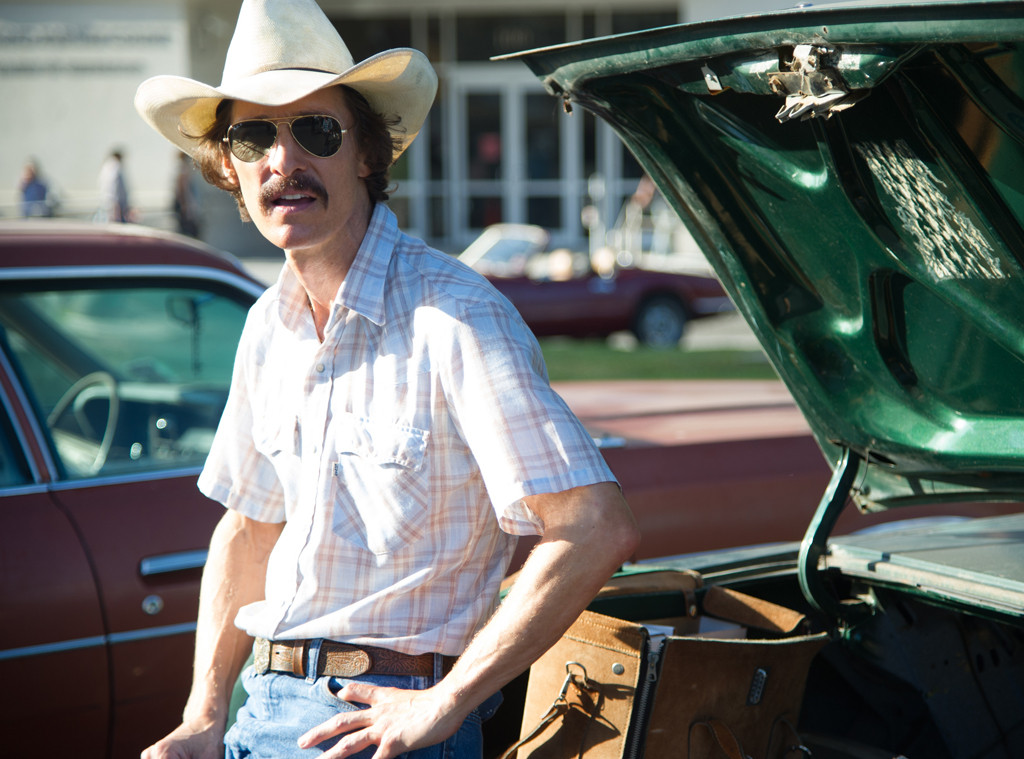Alright alright alright. Dallas Buyers Club posits Ron Woodroof (Matthew McConaughey) as an Oskar Schindler type for AIDS patients and homosexuals against the FDA. That type of flawed lead 3 years ago would be nowhere near McConaughey’s acting range; however, the present day man has been on an acting roll, perhaps culminating with this one. Dallas Buyers Club is anchored by a stellar performance by McConaughey, with some interesting period piece material on AIDS and the drug companies thrown in. I can’t believe I’m writing this about the star of Failure to Launch.
The titular Woodroof (McConaughey) opens showcasing his heterosexuality. He’s the man’s man: an electrician in Texas who rides bulls. However, his drug use and unprotected sex causes him to contract the HIV virus. In the 80s, AIDS was seen as a gay plague, so Woodruff becomes immediately ostracized amongst his friends, and ends up in Mexico. Searching for ways to live longer after a doctor (Jennifer Garner) gives him 30 days to live, Woodroof finds some non-FDA-approved drugs and gets healthier. Seeing a monetary opportunity, Woodroof bring the drugs across the border and sells them to AIDS patients with transvestite Rayann (Jared Leto) under the guise of the Dallas Buyers Club. As time goes on, Woodroof sees homosexuality as less of an enemy than the FDA and more as a misunderstood group of people.
The Dallas Buyers Club nails the AIDS paranoia. Seen mostly as a disease of the lesser at the time, anyone who contracted the virus was shunned to the outskirts as a moral demon. Though the movie paints a simplistic view of both sides, placing Ron squarely on the anti-gay side and seeing him shift to the middle gives Dallas Buyers Club its emotional arc. The movie also has a surprisingly engaging undercurrent of the drug culture in the US, and how money speaks greater than actual need. Again, the movie doesn’t posit anything already understood, but it adds some challenges and wrinkles to Ron’s business and personal development.
Character development in Dallas Buyers Club is mostly relegated to Ron. The rest of the cast is mostly broadly drawn types: the gay person Ron connects with, the jerk money-driven doctor, the crusading disease-curing doctor/love interest, the manly men. Most of these people remain as they were in the beginning by the end of the film, with little pieces of their lives thrown in. Since this is basically Ron’s story, running time is mostly devoted to him, though giving more complexity to these characters would make Dallas Buyers Club into a great film instead of just a good one.
I already had McConaughey nominated as a best supporting actor for Mud, but this at least puts him into the discussion for the very crowded best actor field. McConaughey nails all the checkpoints: he emaciates himself weight wise, his frustration sizzles without ever going over the top, and he gives to Woodroof charm and vulnerability that makes him believable and relatable. A story this bleak with a weak supporting cast should stall during some periods, but McConaughey’s constant presence keeps the Dallas Buyers Club constantly fighting forward, like Ron Woodroof himself. Of the supporting cast, Jared Leto and Jennifer Garner are the strongest of the two types. Leto’s role is more showy as Rayann, but he gets no complexity outside of one scene in a bank; Garner gets more material, but it is minimal at best. She does work well together with McConaughey.
Social justice through narrative character arc usually result in some fantastic films: Schindler’s List, District 9, etc. Dallas Buyers Club misses the top-tier, but thanks to Matthew McConaughey, demands to be taken seriously. It’s amazing how relevant Dallas Buyers Club is today (as Philadelphia was for AIDS in the 90s) with gay marriage being in referendum everywhere. It’s like McConaughey said: “I get older, they stay the same age.”

